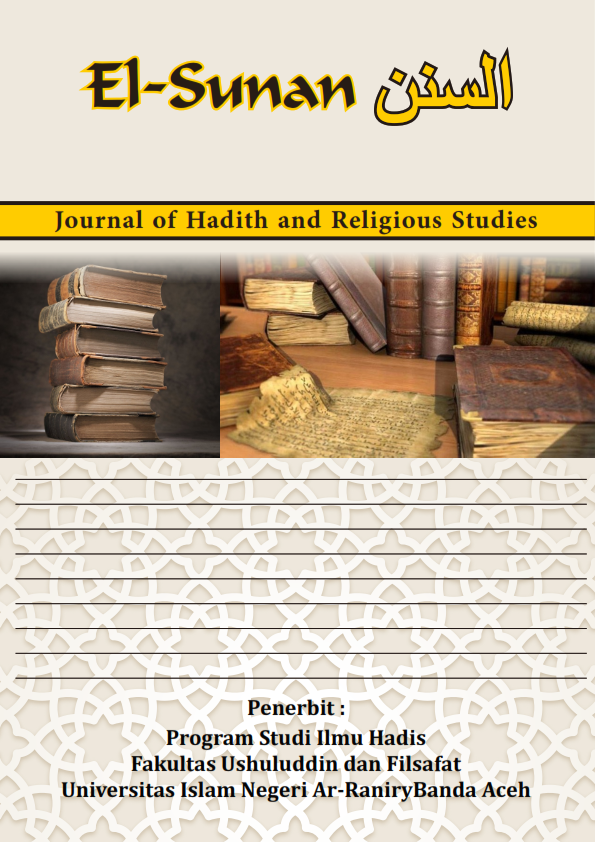The Role of Hadith in Enhancing Quranic Literacy
DOI:
https://doi.org/10.22373/el-sunan.v3i1.7466Keywords:
Hadith, Quranic Literacy, Interpretation, EmbodimentAbstract
This study explores the integral role of hadith in enhancing Quranic literacy by demonstrating how prophetic traditions function as interpretive, applicative, and complementary elements to the Quranic text. Utilizing a qualitative-descriptive approach based on library research, the study examines primary Islamic sources—including classical tafsir and authenticated hadith collections—and contemporary scholarly literature. The findings show that hadith fulfills three critical functions: (1) clarifying Quranic verses through interpretive explanation (bayān al-tafsīr), (2) reinforcing Quranic commands via consistent prophetic practice (bayān al-taqrīr), and (3) providing legal elaboration on matters not explicitly addressed in the Quran (bayān al-tashrīʿ). Furthermore, hadith contextualizes revelation through the transmission of asbāb al-nuzūl and serves as the ethical embodiment of Quranic values in real life. The study concludes that integrating hadith into Quranic studies is not optional but imperative, as Quranic literacy without prophetic guidance risks remaining abstract, fragmented, and misapplied. This research affirms the necessity of hadith as a methodological, pedagogical, and spiritual anchor for meaningful engagement with the Quran.
References
Abu-Alabbas, Belal, Michael Dann, and Christopher Melchert, eds., Modern Hadith Studies (Edinburgh University Press, 2020)
Al-Ayyubi, M. Zia, ‘Tilawah of the Quran in Anna M. Gade’s View : Philosophical Studies and Its Relevance to the Quranic Sciences’, Millati: Journal of Islamic Studies and Humanities, 5.1 (2020), pp. 65–80, doi:10.18326/mlt.v5i1.65-80
Amin, Kamaruddin, ‘Muslim Western Scholarship of Hadith and Western Scholar Reaction: A Study on Fuat Sezgin’s Approach to Hadith Scholarship’, Al-Jami’ah: Journal of Islamic Studies, 46.2 (2008), pp. 253–77, doi:10.14421/ajis.2008.462.253-277
Amri, ‘Tafsir Al-Qur’an Pada Masa Nabi Muhammad Saw Hingga Masa Kodifikasi’, Shautut Tarbiyah, 20.1 (2014), pp. 18–37, doi:10.31332/STR.V20I1.32
Avicena, Fayiz Yan, and Alfiyatul Azizah, ‘Iqra’ As the Beginning of Civilization Transformation Thematic Interpretation of QS. Al Alaq Verses 1-5’, Proceeding ISETH (International Summit on Science, Technology, and Humanity), 2025, pp. 848–57, doi:10.23917/iseth.5471
Fikri, Hamdani Khairul, ‘Fungsi Hadis Terhadap Al-Qur’an’, TASÂMUH, 12.2 SE-Articles (2015), pp. 178–88 <https://journal.uinmataram.ac.id/index.php/tasamuh/article/view/181>
Hidayat, Hamdan, ‘SEJARAH PERKEMBANGAN TAFSIR AL-QUR’AN’, Al-Munir: Jurnal Studi Ilmu Al-Qur’an Dan Tafsir, 2.01 (2020), pp. 29–76, doi:10.24239/al-munir.v2i01.46
Jaya, Septi Aji Fitra, ‘AL-QUR’AN DAN HADIS SEBAGAI SUMBER HUKUM ISLAM’, JURNAL INDO-ISLAMIKA, 9.2 (2020), pp. 204–16, doi:10.15408/idi.v9i2.17542
Lawrence, Bruce, Biografi Al-Qur’an (Digossia Media, 2008)
Maisyarah, Pupungawi, and Ihwan Amalih, ‘Literasi Dalam Al-Qur’an: Tinjauan Tematik Tafsir Al-Mishbah’, Al Furqan: Jurnal Ilmu Al Quran Dan Tafsir, 6.2 (2023), pp. 246–63, doi:10.58518/alfurqon.v6i2.1853
Makhfud, Akhmad, Abdul Khamid, and Ruwandi Ruwandi, ‘Literacy Value of Surat Al-’Alaq Verses 1–5 In Tafsir Al-Mishbah and Its Implementation in Madrasah.’, At-Tajdid : Jurnal Pendidikan Dan Pemikiran Islam, 5.2 (2022), p. 1, doi:10.24127/att.v5i2.1758
Nelson, K, The Art of Reciting the Qur’an (University of Texas Press, 1986)
Noor, Umar Muhammad, ‘The Revival Of Hadith Study In Modern Time’, 2020, pp. 711–19, doi:10.15405/epsbs.2020.10.02.66
Nurkholifah, Siti, ‘The Role of Al-Quran Literacy in Deepening Understanding of Islamic Religious Education’, AFKARINA: Jurnal Pendidikan Agama Islam, 9.1 (2024), pp. 47–60, doi:10.33650/afkarina.v9i1.9357
Rahman, Fazlur, Tema-Tema Pokok Al-Quran (Mizan Publishing, 2018)
Raju Pratama Marronis, Ibnu Majah Arifin, Elsya Frilia Ananda N, Wismanto Wismanto, and Dini Gita Sartika, ‘Analisis Kesempurnaan Akhlak Nabi Muhammad Saw Ditinjau Dari Al Qur’an Dan Sunnah’, Jurnal Manajemen Dan Pendidikan Agama Islam, 2.3 (2024), pp. 88–101, doi:10.61132/jmpai.v2i3.254
Rasyid, Muhammad Dirman, and Anugrah Reskiani, ‘MEMAHAMI KEMUKJIZATAN AL-QUR’AN’, PAPPASANG, 4.1 (2022), pp. 42–61, doi:10.46870/jiat.v4i1.178
Salmiarti, Rahma, Madinatul Zahra, Widya Alfa Risky, Ahmad Sabri, and Rully Hidayatullah, ‘Transformation of Qur’an and Hadith Learning Through Merdeka Curriculum in Indonesia’, AL-IMAM: Journal on Islamic Studies, Civilization and Learning Societies, 5.1 (2024), pp. 35–44, doi:10.58764/j.im.2024.5.60
Saparullah, Ary, ‘Urgensi Kedudukan Hadist Terhadap Al-Qur’an: Bayan Al-Ta’kid, Bayan Al-Tafsir, Dan Bayan Al-Tasyri’, Jurnal Tana Mana, 2.1 (2021), pp. 57–64, doi:10.33648/jtm.v2i1.152
Sulidar, Sulidar, ‘Urgensi Kedudukan Hadis Terhadap Alquran Dan Kedudukannya Dalam Ajaran Islam’, Journal Analytica Islamica Analytica Islamica, 2.2 (2013) <https://garuda.kemdikbud.go.id/documents/detail/810757>
Supriadi, Udin, Tedi Supriyadi, and Aam Abdussalam, ‘Al-Qur’an Literacy: A Strategy and Learning Steps in Improving Al-Qur’an Reading Skills through Action Research’, International Journal of Learning, Teaching and Educational Research, 21.1 (2022), pp. 323–39, doi:10.26803/ijlter.21.1.18
Usman, Iskandar, ‘Hadis Pada Masa Rasulullah Dan Sahabat: Studi Kritis Terhadap Pemeliharaan Hadis’, El-Usrah: Jurnal Hukum Keluarga, 4.1 (2021), p. 47, doi:10.22373/ujhk.v4i1.9173
Winda, Sari, ‘Pemikiran Hadis Dr. Sulidar M.Ag.’, Al-Mu’tabar: Jurnal Ilmu Hadis, 1.1 (2021), pp. 30–41 <https://jurnal.stain-madina.ac.id/index.php/almutabar/article/view/384>
Downloads
Published
How to Cite
Issue
Section
License
Copyright (c) 2025 Fauzi Saleh

This work is licensed under a Creative Commons Attribution-NonCommercial-ShareAlike 4.0 International License.
- Authors retain copyright and grant the journal right of first publication with the work simultaneously licensed under an Attribution-NonCommercial-ShareAlike 4.0 International (CC BY-NC-SA 4.0) that allows others to share the work with an acknowledgment of the work's authorship and initial publication in this journal.
- Authors are able to enter into separate, additional contractual arrangements for the non-exclusive distribution of the journal's published version of the work (e.g., post it to an institutional repository or publish it in a book), with an acknowledgment of its initial publication in this journal.
- Authors are permitted and encouraged to post their work online (e.g., in institutional repositories or on their website) prior to and during the submission process, as it can lead to productive exchanges, as well as earlier and greater citation of published work.










